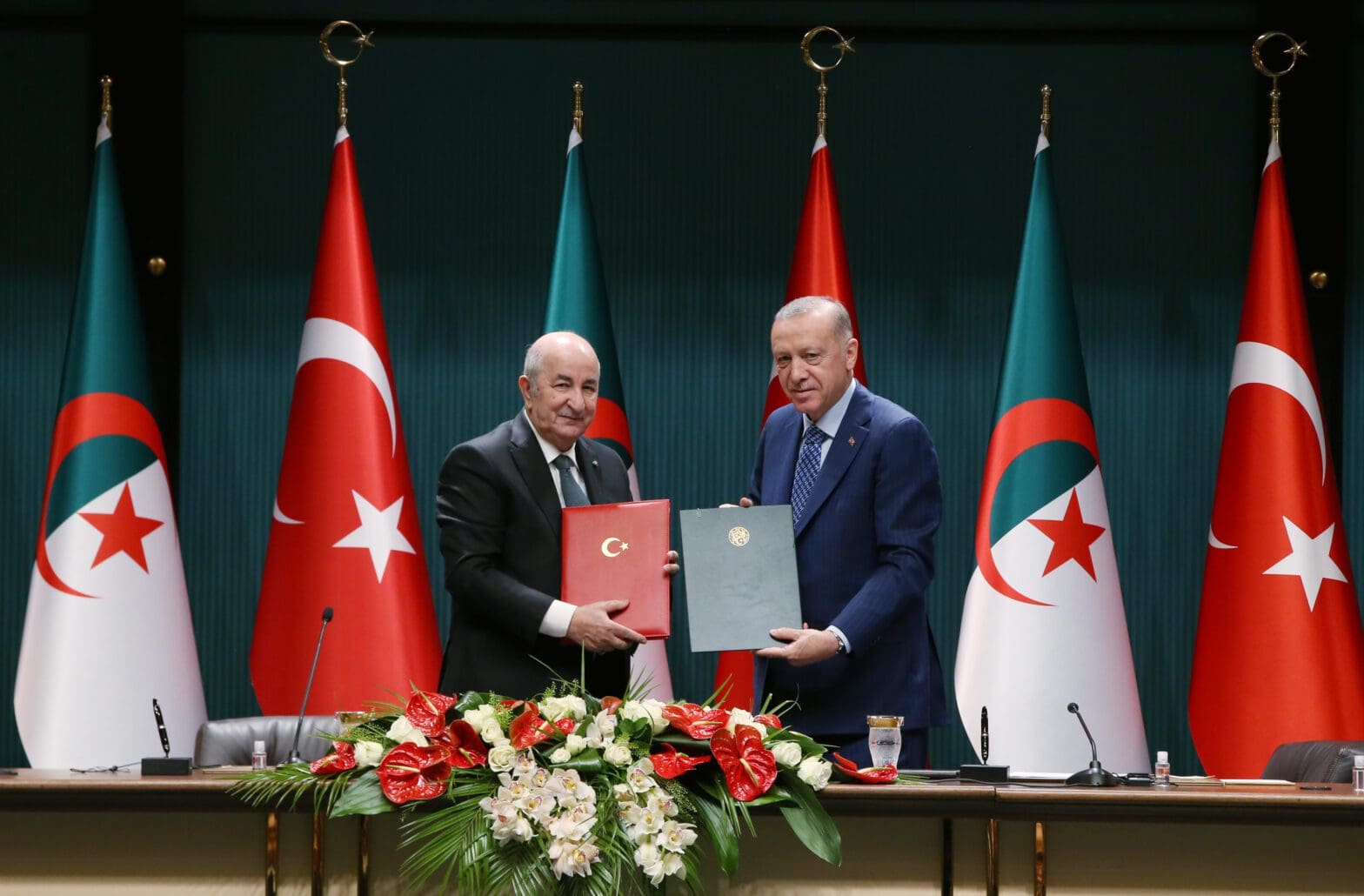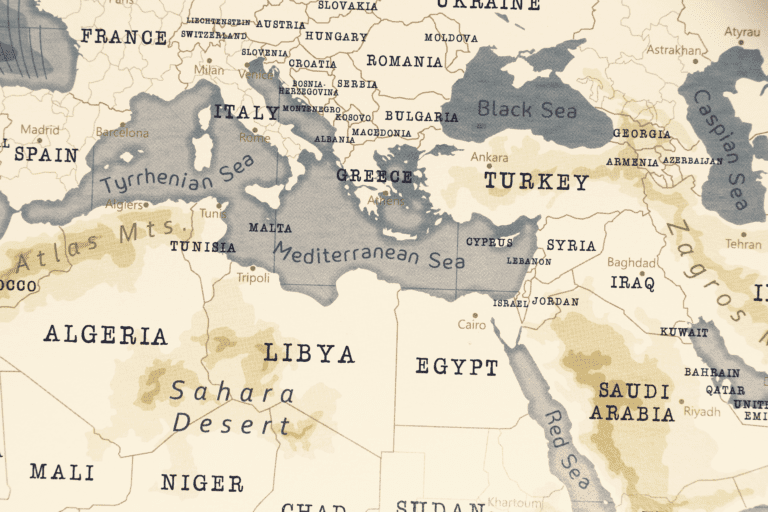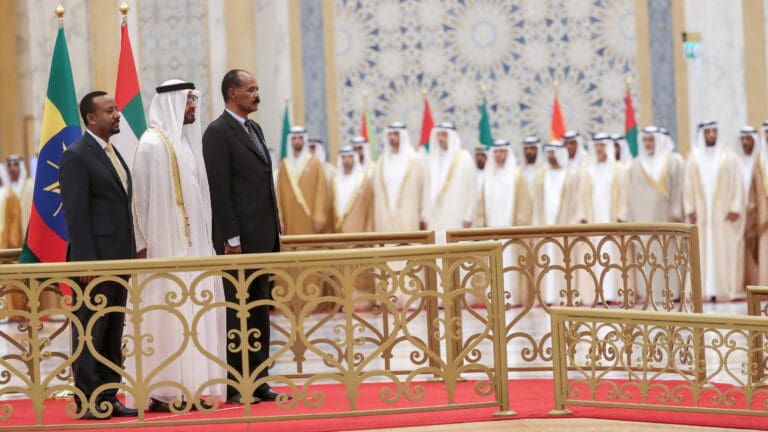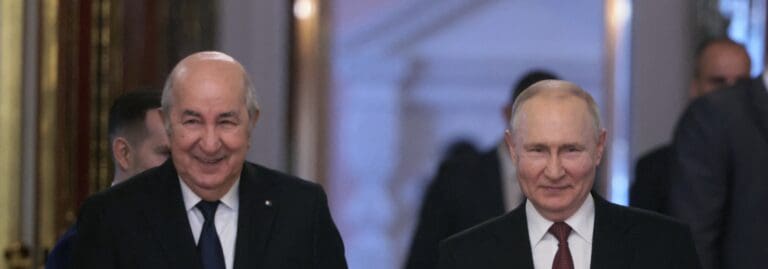
Türkiye and Algeria:
A Promising Evolution
Issue Brief, June 2023
Key Takeaways
A Strategic Partnership: Algeria and Türkiye have built a strategic partnership premised on shared stances towards international issues and mutual interests. Algeria represents a strategic gate, for Türkiye, to the Sahel and Sub-Saharan Africa. For Algeria, Türkiye provides an appealing development model.
Stronger Economic Ties: Algeria is one of Türkiye’s main trade partners in Africa. With intensified economic relations in the last decade, Türkiye aspires to triple the volume of bilateral trade from $3 billion to $10 billion. Turkish investments in Algeria, which have surpassed China’s, are significant across a multitude of sectors.
Growing People-to-People Relations: Turkish-Algerian people-to-people relations have strengthened considerably. Türkiye has eased visa requirements for Algerians, facilitating growth in tourism. Shared heritage and history have also increased Algerians’ interest in Türkiye, as has Türkiye’s cultural soft power in the form of Turkish TV series.
Balance will be Instrumental to Strengthening Relations: Türkiye shares good relations with both Algeria and Morocco, necessitating the importance of preserving a balance between both rivals, particularly on the issue of the Western Sahara. Türkiye will also have to balance between increasing its economic footprint abroad and addressing domestic economic downturn.
Introduction
Algeria shared a political and cultural history with Türkiye under the Ottoman Empire. The Ottoman presence in Algeria, generated by the need to defend against European powers at a time of collapse of regional dynasties, started with the Barbarossa brothers in 1516 and lasted until 1830. After the collapse of the Ottoman Empire and the establishment of the Republic of Türkiye in 1923, the Kemalist state renounced its sphere of influence in the Maghreb region. This position has changed considerably since the early 2000s under the premiership and later presidency of Recep Tayyip Erdoğan.
Under Erdoğan, Türkiye has sought to activate an ostensibly neo-Ottoman policy, which began under Turgut Özal in the late 1980s,1 and an Islamist leaning agenda, affirming its role in the Mediterranean and in the Ottoman Empire’s former Arab provinces.2 Turkish foreign policy has endeavored to increase multifaceted cooperation with and commitment to Arab countries in a stable and secure environment. Overall, the interest in the Middle East and North Africa (MENA) region and the Maghreb, specifically, is driven by geoeconomic imperatives3 and geopolitical and cultural factors.
Türkiye’s Islamist leaning government capitalized on the successes of Islamist movements, following the Arab uprisings, to foster political alliances in the southern Mediterranean. Ankara spread its influence in the region through the establishment and enhancement of geostrategic and geoeconomic relations.4 Türkiye’s move towards the Arab region might have been induced by the European Union’s (EU), particularly France’s, ostracization of Ankara.5 This move was welcomed by Arab states because it offered an opportunity to diversify relations and reduce dependence on the United States and the EU. The development of Algerian-Turkish relations was therefore set against this backdrop.
The Rebuilding of Relations
The Stain of the Cold War
While Algerian-Türkish ties have strengthened, their relationship has historically experienced rifts. Algeria’s wariness of Türkiye is derived from three primary factors. The first pertains to Türkiye’s role during the Cold War when it opposed Algeria’s independence from France. Türkiye voted against Algeria’s independence in the United Nations (UN) General Assembly in 1955, and abstained in 1957, 1958, and again in 1959.6 The wartime independence movement interpreted Türkiye’s abstention as support for France,7 although Türkiye’s position derived from the need to stand by its North Atlantic Treaty Organization (NATO) allies. In 1960, with the change of government, Türkiye voted in favor of Algeria’s independence. Even prior to its official support for Algeria in 1960, Türkiye provided aid to Algerian nationalists.8 In 1985, Turgut Özal, Prime Minister at the time, apologized for Türkiye’s partiality towards France in the 1950s.9
Secondly, Türkiye – Algeria ties were complicated by Türkiye’s relations with Israel. The Algerian state and society’s staunch support for the Palestinian cause meant that Türkiye’s ties with Israel were a source of contention. Turkish authorities stressed their support for Palestine, asserting that relations with Israel would not undermine Türkiye’s support for the Palestinian people.10
Thirdly, a decade- long battle, in Algeria, between Islamist militants and security forces in the 1990s created resentment, within segments of the Algerian establishment and society, mainly secularists, towards harnessing closer ties with Türkiye’s AKP. Türkiye’s support for, and the coming to power of, Islamist parties in Tunisia, Libya, Morocco, and Egypt fueled Algerian secularists’ resentment.
The Rassemblement National Démocratique (RND), a pro-government nationalist party, for instance, accused the Movement for Society and Peace (MSP) or (Hamas) “of obeying in [its] strategy an agenda dictated by foreign powers” which was interpreted as likely referring to the ties “displayed by the MSP with its alter ego, the Turkish AKP, led by Erdoğan.”11 Empowered by Islamist movements across the region, the MSP attempted to position itself as a modernist, Islamist reformist party, capable of governing, like the Turkish AKP.12 The MSP’s leadership believed the party was capable of achieving an overwhelming victory at the 2012 local elections— following in the footsteps of Tunisia, Morocco, and Egypt—where Islamists took power.13 However, the parties’ aspirations failed to materialize.
Despite the aforementioned issues, relations between both countries witnessed a gradual reset. The Ottoman Empire’s presence, which spanned three centuries, embedded a sense of shared historical and cultural past for Algerian state and society. Algerian-Turkish relations have now charted a new course characterized by a strengthening of ties across all levels.
Political Relations: The Primacy of Regional Stability
The Political Dimension
Although Türkiye’s engagement with the Maghreb and Sub-Saharan Africa is fundamentally premised on geoeconomic interests, the political dimension is also critical. Deteriorating relations with Egypt meant that Türkiye needed a reliable, stable partner in North Africa. Algeria emerged as an attractive partner given Türkiye and Algeria’s efforts to counter France’s influence in the Sahel and Libya. Both countries also developed a similar position on Libya, supporting the government in Tripoli and countering the United Arab Emirates (UAE), France, and Egypt.
Algeria and Türkiye share some similar principles in their foreign policies, namely on sovereignty, respect for the territorial integrity of other states, noninterference in other countries’ domestic affairs,14 and political independence. These overlapping principles are inscribed in the 2006 Treaty of Friendship and Cooperation15 (hereafter The Treaty) and constitute the foundation upon which Algerian-Turkish relations evolved.
Türkiye is an essential player in the Maghreb region; but it has faced political and economic challenges.16 However, Türkiye’s ability “to reconcile democracy, Islam and economic development has made it an attractive model,”17 unlike the West whose image has been corroded by its interventions and pressures for democratization in the region. Despite criticism of Erdoğan’s authoritarianism among Algerian liberals,18 Türkiye’s runoff presidential election was perceived as “a real lesson in democracy for the whole world, especially for Arab and Muslim countries.”19
Algeria is an important regional middle power, a status it shares with Türkiye, and occupies a significant geopolitical position in the Mediterranean. Its size and strategic location provide an ideal gateway into the rest of Africa, where Türkiye has sought to increase its economic footprint, vying for influence in France’s old dominion.20 Algeria has also been an integral actor in the region’s fight against terrorism, mediating between warring parties in the Sahel and the Horn of Africa, and promoting peace and stability in the region; roles acknowledged by President Recep Tayyip Erdoğan.21
Algiers is also an important member of the African Union and the Non-Aligned Movement, presenting a few similarities with Türkiye’s balancing-act policies.22 Naturally, strengthened relations with Algeria serve Türkiye’s interests and influence in the Maghreb, Sahel, and Sub-Saharan Africa which fueled Erdoğan’s consistent interest in Algeria. In June 2013, during his time as prime minister, he toured the Maghreb region. At the time, Turkish-Egyptian relations had deteriorated considerably following the removal of Mohamed Morsi from power; consequently, Algeria gradually emerged as Türkiye’s key partner in North Africa.
Erdoğan had two priorities within Algeria: security cooperation and socioeconomic development.23 In November 2014, as Türkiye’s president, Erdoğan visited Algeria to boost relations and, in February 2018, the first stop on Erdoğan’s Africa tour was Algeria resulting in the signing of seven partnership agreements in energy, tourism, culture, agriculture, and diplomacy.24 Prior to his visit, Erdoğan wanted a reciprocal abolition of visas but Algerians rejected it out of concerns over the use of Türkiye as a “transit…for jihadists [to] Syria, Iraq, and…Libya…[which]…could be detrimental to Algeria, which faces the threat of terrorism on its borders.”25
Significant political advances took off in 2020. During the Conference on Libya in Berlin,26 Erdoğan met with newly elected Algerian President Abdelmadjid Tebboune. Shortly after, Erdoğan undertook a state visit to Algeria sanctioned by the signing of a Joint Declaration to establish a bilateral High-Level Cooperation Council, highlighting the emergent comprehensive relationship between Algeria and Türkiye.27
Erdoğan stressed Türkiye’s commitment which “do[es] not consider Algeria as a market to sell our products, but we also aspire to the realization of important investments” and, of course, to the development of key political dialogues and agreements with Algeria.28 This visit coincided with Algeria and Türkiye’s increasingly converging views on the situation in Libya, where both backed the Government of National Accord (GNA) against Field Marshal Khalifa Haftar, who was backed by France, Saudi Arabia, Egypt, and the UAE. Moreover, Algeria thwarted Egypt’s bid to condemn Türkiye—due to Egypt’s disapproval of Türkiye’s ostensible intervention in regional political affairs—in the Arab League. Egypt also sought retaliation against Türkiye’s backing of Mohamed Morsi and his supporters.29
Türkiye and Algeria’s backing of the GNA fostered greater cooperation between them. To protect its economic interests30 in Libya, Türkiye initially opposed Western intervention.31 Similarly, Algeria vehemently opposed NATO’s intervention, preferring to promote its own solutions to the civil war in Libya32 within the United Nations and the African Union. Algeria urged dialogue among Libyan factions (except ISIS and Al-Qaida), stressing the need for peaceful solutions, and the rejection of foreign interventions.
However, Ankara eventually supported intervention once it became inevitable and when the transition was expected to be successful.33 Initially, Algeria was apprehensive about the deployment of the Turkish military in Libya, believing this would exacerbate instability. Algiers feared that a militarized presence would result in an increased circulation of weapons and presence of armed groups along its 1,000-kilometer border with Libya.
The potential of the conflict, particularly as it involved various foreign actors, leading to an Egyptian military intervention was also concerning for Algeria.34 Gradually, Algeria adopted an increasingly nuanced political understanding of Türkiye’s intervention, which thwarted Haftar’s forces’ advance towards Tripoli. Algerians considered Haftar’s attempt to seize Tripoli “a red line,”35 along with his threats to attack Algeria,36 that represented a national security threat, signaling that Algeria was willing to intervene militarily to stop him.
Türkiye’s involvement in Libya also pertained to its broader objectives in the Eastern Mediterranean, which boasts considerable hydrocarbon resources, as well as the billions of dollars in construction and other sectors contracts.37 The conflict also jeopardized Algeria’s economic interests; the Algerian hydrocarbon company Sonatrach, which had important investments in Libya, suspended its activities in Libya in 2011.38 Algeria and Türkiye agreed that a negotiated political solution is the best path towards peace and reconciliation—a position consistent with the conclusions of the Berlin Conference39 but contrary to Egypt’s, which vehemently rejected the inclusion of Islamists.40
Türkiye and Algeria’s political ties were further consolidated by Türkiye acceding to Tebboune’s demand to repatriate the deserter Chief Adjutant Guermit Bounouira, former aide to Ahmed Gaid-Salah, former military chief of staff. Bounouira had fled to Türkiye, where he attempted to acquire naturalization in exchange for sharing confidential information on Algeria’s National Popular Army (ANP).41 Algeria has also supported Türkiye in its crackdown on, what it has labelled, the Fetullah Terrorist Organization (FETO).42 After Türkiye’s attempted coup, in 2016, Algeria expelled Turkish businesspeople and companies linked to Gülen. The government also closed the Gülen school in Algiers.43 Moreover, in 2020, Algeria extradited to Ankara a Turkish political opponent suspected of links to FETO.44
During Tebboune’s state visit to Türkiye, in May 2022, Erdoğan highlighted both states’ shared stances45 on political issues such as Libya, Palestine,46 the Sahel,47 and the Russia-Ukraine war. Erdoğan stressed that talks with Tebboune focused on joint actions to be taken on the international level regarding these issues and alluded to the development of diplomatic cooperation through meetings of the Joint Cooperation Council.48 The meetings would be facilitated by the respective foreign affairs ministers, of both countries, and under the supervision of both presidents.
On the issue of the Western Sahara, Türkiye has adopted a neutral position given the salience of the issue for both Algeria and Morocco. Türkiye shares expansive relations with Morocco across various areas including economic cooperation and defense ties.49 Both are signatories of a Free Trade Agreement (FTA) effective since 2006;50 however, the agreement has faced issues.51
Hence, when asked about recognizing Morocco’s sovereignty over the Western Sahara, Tanju Bilgiç, spokesperson for the Turkish Ministry of Foreign Affairs, responded by stating, “Turkey calls for a political solution to the Western Sahara issue within the framework of relevant UN resolutions…[and] dialogue” stressing Türkiye’s support for “the territorial integrity and sovereignty of all countries…within its internationally recognized borders.”52 This highlights Türkiye’s neutral position which is grounded in international legal frameworks.
Algeria and Türkiye, with some nuances given that Türkiye is a NATO member, show some similarities in their position on the Russia-Ukraine war. Algeria has maintained a neutral position, while Türkiye, which provides weapons to Ukraine, plays a balancing act, abstaining from imposing sanctions on Russia to preserve its geopolitical interests.53 Both have pursued balanced policies driven by their respective interests (gas, armaments, and wheat). Algeria maintains long-established relations with both Russia and Ukraine, and has called for a negotiated solution,54 while Türkiye has played a mediation role.55
Overall, Algerian-Turkish political relations have strengthened and expanded. President Tebboune’s statement that both countries now share a “common vision” regarding several dossiers, during his visit to Türkiye in May 2022, is a testament to the robustness of Algerian- Turkish relations.56
The Expansion of Economic Ties
Economic engagement between Türkiye and Algeria has grown considerably; however, several key differences exist between both economies. The major difference being that while Algeria is a rentier economy—dependent on hydrocarbon revenues57—Türkiye is an emerging market with a diverse economy. In terms of Gross Domestic Product (GDP), the Turkish economy ranks as the 20th largest in the world,58 whereas Algeria ranks 56th.59 The size of the Turkish economy, in terms of population size, is also considerably larger than that of Algeria. The latter boasts a lucrative market of 45 million people; however, the former’s population is roughly double this size.
Although Türkiye’s economic relations with Algeria took off in the early 2000s, the economic losses suffered by both due to the Libyan conflict contributed to the acceleration of Ankara’s economic ties with Algiers. As with strengthening relations with China or Russia, expanding ties with Türkiye enables Algeria to reduce its economic and political dependence on powers such as the United States or France.60 Economic ties extend to several domains—including investment, energy, housing construction, and infrastructure works— all of which are critical for Algeria’s development.
Algeria’s economy also bears striking similarities to Türkiye’s prior to the latter’s reformation, opening of the economy, and modernization of its financial system in the late 1980s, 1990s, and 2000s. Therefore, Algeria can draw from Türkiye’s development model.61 Türkiye could also facilitate Algeria’s transition towards implementing necessary structural and economic reforms, including modernizing its financial system, which would attract foreign investments. The fact that Algeria has been able to attract a high level of investment from Türkiye reflects the extent to which both countries share mutual interests.
Türkiye’s pivot towards Algeria coincided with Türkiye’s increased interest in Africa where it has established a considerable economic presence. In the early 2000s, Türkiye pursued a multi-regional foreign policy orientation; its interest in Africa, in particular, grew significantly. Thus, Türkiye dubbed 2005 the Year of Africa.62 Algeria’s interests overlapped with Türkiye’s intention to diversify its alliances, which explains the willingness of both presidents to develop a comprehensive global partnership.
The framework of the Algeria-Türkiye partnership is inscribed in the 2006 Treaty, in which both parties “committed to promoting the socioeconomic development of their populations, and to establish specific programs and projects in the different sectors.”63 Within the Algerian economy, Türkiye has had a notable presence and has competed with local firms in industries such as construction, energy, manufacturing, and textiles.
Türkiye’s approach is largely driven by its geoeconomic interests with a focus on trade, investment, and manufacturing.64 The private sector has played an active role in securing these interests. In 2013, Prime Minister Erdoğan came to Algeria accompanied by a delegation of 200 businesspeople.65
In 2014, Erdoğan engaged the business community, through the Economic Forum of Algerian-Turkish Businessmen, and extended a ten-year natural gas contract, delivering gas from Algeria to Türkiye, for another 10 years, during his first visit to Algeria as president.66 At the time, Erdoğan also promised to increase the volume of bilateral trade from about $3 billion to $10 billion in the future.67 Both states’ ties were further enhanced during Erdoğan’s visit in February 2018, which culminated with the signing of seven agreements of partnership in numerous sectors.68
Erdoğan’s visit in January 2020 and Tebboune’s state visit to Türkiye in 2022 cemented the growing ties and reflected the “strategic rapprochement”69 sought by both sides. During his 2020 visit, Erdoğan reported the presence of 377 Turkish investment projects across Algeria, highlighted the magnitude of Turkish investments in Algeria which were valued at over $3.5 billion dollars, and facilitated the creation of 30,000 jobs.70 Algeria’s status as the third largest host country globally to Turkish companies reflects the weight of Türkiye’s economic investments in Algeria.71 During the trip, he also visited a new Turkish72 steel plant.73
In terms of trade (see figures 1,2,), in 2019, Türkiye was Algeria’s 6th largest supplier, while Algeria was Türkiye’s 5th largest customer.74
Figure 1. Algeria-Türkiye trade 2013-2020.75
A. Exports from Algeria to Türkiye 2013-2020 (millions USD)
B. Imports from Türkiye to Algeria 2013-2020 (millions USD)
A and B are drawn using Statistiques du Commerce Extérieur [Foreign Trade Statistics] for 2013-2019 from Ministère des Finances of Algeria, “Rapport Periodiques [Periodic Reports],” Direction Générale des Douanes, https://www.douane.gov.dz/spip.php?rubrique200.
Both countries are committed to the promotion of economic ties and exploring business partnership opportunities in manufacturing, construction, petrochemical, textile, automotive, and food sectors, and in the cultural and social realms. By June 2022, Türkiye met its investment target of $5 billion in Algeria and the number of Turkish companies in Algeria reached 1,400.76
Investments have extended to agriculture, milk production, cotton, and wheat.77 Tebboune’s visit in May 2022 resulted in the signing of 15 agreements,78 including in energy, which is significant in Algerian-Turkish relations.79 (see figure 2).80
Figure 2: Türkiye’s natural gas imports by source countries 2021 (%)
Source: Energy Market Regulatory Authority, “Turkish Natural Gas Market Report 2021,” Republic of Turkey, 12, https://www.epdk.gov.tr/Detay/DownloadDocument?id=ZlSep71XT+M=.
In November 2022, Sonatrach and Turkish Petroleum created a joint oil and natural gas exploration company to operate across the region.81 In late 2022, Fatif Dönmez, Türkiye’s minister of energy, stated that Türkiye was committed to doubling its investments to $10 billion over the next few years,82 asserting that defense cooperation should also be strengthened, a sentiment echoed by Minister of Foreign Affairs Mevlüt Çavuşoğlu.83 Thus, for historical, cultural, economic, and geopolitical reasons, Algeria has now become one of Türkiye’s “leading trade partners in Africa.”84
Cooperation Within Military and Defense
In 2003, against the backdrop of rising terrorism in the aftermath of the 9/11 attacks, ANP officials signed a cooperation agreement with their Turkish counterparts.85 This raised unfounded suspicions that Algeria was integrating an alliance with the United States86 or with a Turkish-U.S. alliance, whereby Türkiye would play a pivotal role in the Eastern Mediterranean while Algeria would have a similar role in the Western Mediterranean.87 However, Algeria was unwilling to abandon its independent and nonaligned foreign policy.88 The 2003 cooperation agreement was underpinned by a Turkish desire to benefit from Algeria’s extensive experience in the fight against militant extremism, while the ANP would gain access to Turkish military technology within the air and naval domains.
In December 2022, Mevlüt Çavuşoğlu argued for increased collaboration between both sides to bring peace and stability to the region, reflecting an interest in security cooperation.89 Türkiye’s recent interest in increasing military cooperation can be attributed to several factors. Namely, achieving its aim of increasing its presence in regional politics and pursuing economic interests.90 The second factor relates to arms sales. Algeria became the first international customer of Türkiye’s TAI Aksungur drones in 2022.91 Cooperation in the military and defense industries will likely expand; however, Türkiye’s arms sales to Morocco which amounted to $78.6 million, in the first three months of 2021, compared to $402,000 in 2020,92 are of concern to Algeria. Despite growing Algeria- Türkiye defense ties, Russia, China, Italy, and Germany continue to be Algeria’s primary defense partners.93
Cultural Relations and People-to-People Exchange
Türkiye’s comprehensive efforts to project its culture have brought Algerians and Turks closer. Algerians have become increasingly drawn to Turkish television shows; as opposed to Arab or U.S television. Turkish TV series have been “effective [in] attracting tourists to Turkey and enabling audience[s] to think well of Turkey.”94
People-to-people relations have also evolved. The number of Algerian tourists in Türkiye has increased from about 34,000 in 2000 to nearly 300,000 in 2019 (figure 3).95 Türkiye’s easing of the obtention of visas for Algerian citizens96 has contributed to this increase along with Turkish Airlines, which flies to several Algerian cities with over 35 flights a week,97 facilitating travel of tourists and businesspeople.
Figure 3: Number of Algerian Tourists Arriving to Turkey
Shared heritage and family ties have also generated Algerian interest in their Turkish ancestry. Many Algerians, trace back their ancestry to Turkish origins, and several Algerian names are of Turkish origin (Stambouli, Turki, Kara, Derradji, Zmirli, Demirdji, Bachtarzi, Khaznedji, Karadaniz, Baba Ali, etc.).98 Erdoğan has often referred to the 500 years of historical ties that bind both countries,99 a reference echoed in Algeria.
Conclusion
Algerian-Turkish relations continue to grow considerably in all fields. Congratulating President Erdoğan immediately after his reelection on May 28, 2023, President Tebboune “commend[ed] the distinguished bilateral relations and express[ed] [a] strong will to work together to…push bilateral relations to the highest ranks…in light of the outcomes of the first meeting of the Supreme Cooperation Council held in Ankara in May 2022.”100 Türkiye and Algeria’s prospective membership in the BRICS, will surely add yet another dimension to these relations. People-to-people relations, too, have been significant to strengthening ties. This is illustrated by the Algerian government’s prompt provision of aid to Türkiye,101 following the devastating earthquake in February of 2023, while Algerian society responded by making donations and expressing solidarity.102
The growth of Turkish-Algerian cooperation will likely persist, particularly in trade and investments. Türkiye will invest in manufacturing sectors, mainly steel and energy, and in textiles and agriculture. While some of Türkiye’s production will serve the local market, Türkiye will also use it to deliver goods to Sub-Saharan Africa. However, it will certainly face fierce competition from China, the EU, and Russia. Thus, questions remain about Türkiye’s capacity to compete with these powers, which dominate the Algerian market.
Türkiye also faces the issue of the quality of construction undertaken by Turkish enterprises in Algeria. The massive collapse of buildings during earthquakes in Türkiye raises questions among some Algerian officials and engineers.103 Politically, the main question is whether Türkiye can keep its neutrality on the Western Sahara issue and balance between Algeria and Morocco, both of which are significant to Türkiye. A tilt towards Algeria’s position would be a sign of true friendship.




